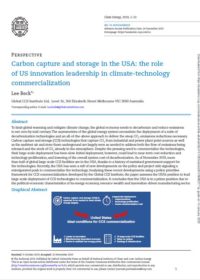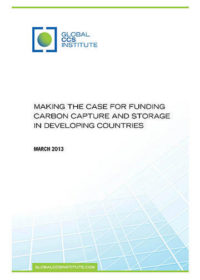Resources
Publications
Our publications, reports and research library hosts over 500 specialist reports and research papers on all topics associated with CCS.
View our Publication Library Disclaimer.
Filter by
The Role of CCS in the Paris Agreement and its Article 6
29th April 2020
Organisation(s): Global CCS Institute
Topic(s): Carbon capture and storage (CCS), Carbon markets, Carbon removal, Policy law and regulation
There has been a growing interest within the Institute’s membership – and elsewhere – in the opportunities to drive the deployment of CCS by the provisions of Article 6 of the Paris Agreement. This paper draws together all the latest information and thinking on the Article and its role in enabling countries to meet the objectives they have set themselves in their Nationally Determined Contributions (NDCs), with particular emphasis on how it can impact CCS.
The paper, authored by our Senior Policy Advisor Eve Tamme and Consultant John Scowcroft, provides insights into the history of Article 6, elaborates on how it can be an enabler for CCS, and looks into the upcoming developments in this field by answering the following questions:
• What does Article 6 do?
• What does Article 6 not do?
• Where is Article 6 in the international climate negotiations?
• What does Article 6 mean for CCS?
• What are the next steps?
Disclaimer
The content within the Global CCS Institute Publications, Reports and Research Library is provided for information purposes only. We make every effort and take reasonable care to keep the content of this section up-to-date and error-free. However, we make no claim as to its accuracy, currency or reliability.
Content and material featured within this section of our website includes reports and research published by third parties. The content and material may include opinions and recommendations of third parties that do not reflect those held by the Global CCS Institute.
Scaling up the CCS Market to Deliver Net-Zero Emissions
20th April 2020
Organisation(s): Global CCS Institute
Topic(s): Carbon capture and storage (CCS), CCS facilities, Policy law and regulation
Understanding how the CCS market is likely to develop over the coming years is of interest to a wide range of stakeholders. It can help inform the timing and design of policies introduced by governments, the scale of the market for potential investors, and the challenges associated with meeting long-term climate targets.
This report aims to inform the discussion on these topics by providing an overview of the near-term and longer-term developments in the CCS market.
It reviews the current CCS facility pipeline, and how that could change in the next few years given project lead-in times. It then considers how this compares to projections of the number of CCS facilities needed to meet long-term climate goals. Throughout the report the number of CCS facilities deployed is used as a proxy for the size of the CCS market.
Disclaimer
The content within the Global CCS Institute Publications, Reports and Research Library is provided for information purposes only. We make every effort and take reasonable care to keep the content of this section up-to-date and error-free. However, we make no claim as to its accuracy, currency or reliability.
Content and material featured within this section of our website includes reports and research published by third parties. The content and material may include opinions and recommendations of third parties that do not reflect those held by the Global CCS Institute.
Investment in clean energy innovation, including CCS has multiple benefits for society, including supporting economic growth and addressing the externalities created by emissions and climate change. Investment in CCS can preserve and create high-quality jobs and accelerate innovation that can help us mitigate climate change. At the same time, climate change remains one of the most complex challenge the world is facing and the sooner emissions can be reduced, the better the chance of fending off its worst impacts. As such, stimulus funds and measures supporting economies with their Covid-19 recovery should be consistent with long-term climate goals.
Find out more in our new factsheet, and a forthcoming report on the Value of CCS.
Disclaimer
The content within the Global CCS Institute Publications, Reports and Research Library is provided for information purposes only. We make every effort and take reasonable care to keep the content of this section up-to-date and error-free. However, we make no claim as to its accuracy, currency or reliability.
Content and material featured within this section of our website includes reports and research published by third parties. The content and material may include opinions and recommendations of third parties that do not reflect those held by the Global CCS Institute.
Global Status of CCS: Brief for Policymakers
4th March 2020
Organisation(s): Global CCS Institute
Topic(s): Carbon capture and storage (CCS), Policy law and regulation
The Global CCS Institute is pleased to present a Brief for Policymakers: CCS - Targeting Climate Change.
The brief summarizes the key findings of the Institute's latest Global Status of CCS Report which documents a range of important milestones for CCS, its status across the world and the key opportunities and benefits the technology presents.
The Brief includes detailed information on:
- CCS and its role in climate mitigation
- CCS deployment around the world
- the role of policy in large-scale deployment and
- updates on the progress, projects, and policies globally.
We hope you enjoy it, share it with colleagues and look forward to working with you as we accelerate the deployment of carbon capture and storage globally.
Disclaimer
The content within the Global CCS Institute Publications, Reports and Research Library is provided for information purposes only. We make every effort and take reasonable care to keep the content of this section up-to-date and error-free. However, we make no claim as to its accuracy, currency or reliability.
Content and material featured within this section of our website includes reports and research published by third parties. The content and material may include opinions and recommendations of third parties that do not reflect those held by the Global CCS Institute.
The European Green Deal: New opportunities to scale up carbon capture and storage
27th February 2020
Organisation(s): Global CCS Institute
Topic(s): Carbon capture and storage (CCS), Carbon removal, Policy law and regulation
The recent reports of the Intergovernmental Panel on Climate Change (IPCC), and the Commission vision for a climate neutral Europe , have mobilised support for climate neutrality by 2050 by most EU Member States. Balancing sources and sinks by 2050, and from that point onwards achieving net negative emissions, can only be delivered through a major economy-wide transformation and by substantially stepping up the use of all climate change mitigation and carbon removal technologies. The European Green Deal as the new big European project is an enormous challenge but also an opportunity to lead by example and transform the European economy.
This overview takes a closer look at the European Green Deal with its extensive list of initiatives, and highlights what to watch out for in the coming days, months and years regarding low carbon technologies like carbon capture and storage (CCS). This paper explores how climate targets, governance, just transition, carbon border adjustment, industrial strategy, hydrogen, financing and infrastructure can support CCS technologies. The second part of the paper highlights the three main challenges for CCS in the existing legislation that need to be considered in the upcoming wave of revisions and new initiatives.
It’s a snapshot of where we are as of February 2020, with a list of initiatives and processes to choose from when engaging with policymakers and stakeholders.
This piece was authored by Eve Tamme, Senior Advisor for Climate Change Policy at the Global CCS Institute.
Disclaimer
The content within the Global CCS Institute Publications, Reports and Research Library is provided for information purposes only. We make every effort and take reasonable care to keep the content of this section up-to-date and error-free. However, we make no claim as to its accuracy, currency or reliability.
Content and material featured within this section of our website includes reports and research published by third parties. The content and material may include opinions and recommendations of third parties that do not reflect those held by the Global CCS Institute.
Carbon capture and storage in the USA: the role of US innovation leadership in climate-technology commercialization
16th January 2020
Organisation(s): Global CCS Institute
Topic(s): Carbon capture and storage (CCS), CCS protocol, Innovation, United States
To limit global warming and mitigate climate change, the global economy needs to decarbonize and reduce emissions to net-zero by mid-century. The asymmetries of the global energy system necessitate the deployment of a suite of decarbonization technologies and an all-of-the-above approach to deliver the steep CO2-emissions reductions necessary. Carbon capture and storage (CCS) technologies that capture CO2 from industrial and power-plant point sources as well as the ambient air and store them underground are largely seen as needed to address both the flow of emissions being released and the stock of CO2 already in the atmosphere. Despite the pressing need to commercialize the technologies, their large-scale deployment has been slow.
Initial deployment, however, could lead to near-term cost reduction and technology proliferation, and lowering of the overall system cost of decarbonization. As of November 2019, more than half of global large-scale CCS facilities are in the USA, thanks to a history of sustained government support for the technologies. Recently, the USA has seen a raft of new developments on the policy and project side signaling a reinvigorated push to commercialize the technology. Analysing these recent developents using a policy-priorities framework for CCS commercialization developed by the Global CCS Institute, this paper by Lee Beck, our US-based Senior Advisor for Advocacy and Communications, assesses the USA’s position to lead large-scale deployment of CCS technologies to commercialization. It concludes that the USA is in a prime position due to the political economic characteristics of its energy economy, resource wealth and innovation-driven manufacturing sector.
Disclaimer
The content within the Global CCS Institute Publications, Reports and Research Library is provided for information purposes only. We make every effort and take reasonable care to keep the content of this section up-to-date and error-free. However, we make no claim as to its accuracy, currency or reliability.
Content and material featured within this section of our website includes reports and research published by third parties. The content and material may include opinions and recommendations of third parties that do not reflect those held by the Global CCS Institute.
Global Status of CCS Report: 2019
9th December 2019
Topic(s): Carbon capture and storage (CCS), CO2 hubs, CO2 storage, CO2 transport, Policy law and regulation
The 2019 Global Status of CCS report documents important milestones for CCS over the past 12 months, its status across the world and the key opportunities and benefits the technology presents.
The report provides detailed information on, and analyses of, the global CCS facility pipeline, policy, CO2 storage and the legal and regulatory environment. In addition, four regional updates and a CCS Technology section further demonstrate global development and the versatility of CCS across a variety of applications and industry sectors.
Disclaimer
The content within the Global CCS Institute Publications, Reports and Research Library is provided for information purposes only. We make every effort and take reasonable care to keep the content of this section up-to-date and error-free. However, we make no claim as to its accuracy, currency or reliability.
Content and material featured within this section of our website includes reports and research published by third parties. The content and material may include opinions and recommendations of third parties that do not reflect those held by the Global CCS Institute.
Waste-to-Energy with CCS: A pathway to carbon-negative power generation
14th October 2019
Organisation(s): Global CCS Institute
Topic(s): Carbon capture and storage (CCS), Waste to energy
A growing global population and rising living standards are producing ever greater quantities of municipal solid waste (MSW). This same growth in population and living standards is also driving ever-larger demand for energy, especially electricity.
A key solution to increasing quantities of waste, rising energy demand and methane emissions from MSW is Waste-to-Energy (WtE); the generation of energy – in the form of electricity and heat – from the processing of waste. The addition of carbon capture and storage (CCS) to WtE has the potential to make waste a zero or even negative emissions energy source, depending upon the origin of the wastes utilised.
In our latest Perspective, Senior Consultant - Capture Technology, David T. Kearns, provides an overview of Waste-to-Energy including how it works and its relation to climate change. The Perspective also discusses how the addition of CCS has the potential to make waste a zero, or even negative, emissions energy source.
Global Status of CCS Report: 2018
10th December 2018
Organisation(s): Global CCS Institute
Topic(s): Carbon capture and storage (CCS), CCS policy, CO2 hubs, CO2 storage, CO2 transport
The Global Status of CCS Report 2018 documents the status of CCS around the world and significant operational milestones over the past 12 months. It demystifies common misunderstandings about the technology and identifies where and how it can, and must, be more widely deployed. It also tracks the worldwide progress of CCS technologies and the key opportunities and challenges CCS faces.
Disclaimer
The content within the Global CCS Institute Publications, Reports and Research Library is provided for information purposes only. We make every effort and take reasonable care to keep the content of this section up-to-date and error-free. However, we make no claim as to its accuracy, currency or reliability.
Content and material featured within this section of our website includes reports and research published by third parties. The content and material may include opinions and recommendations of third parties that do not reflect those held by the Global CCS Institute.
発展途上国におけるCO2回収貯留への資金供与
1st March 2013
Topic(s): Capacity development, Carbon capture and storage (CCS), Project financing
CCSが大規模なCO2 排出削減に貢献するためには、先進国と発展途上国の双方において普及する必要がある。とりわけ、来る数十年においては、化石燃料使用量(およびそれに付随するCO2排出量)の純増大分は全て途上国から生じるものであることが見込まれている状況を勘案すると、途上国における普及は重要である。一方、大部分の途上国においては、CCSが必要となるような気候変動の悪化こそ認められるものの、CCSが果たして商業ベースにのるかどうかについては、現状は心もとない状況にある。本レポートは、2012年4月25日にロンドンにて開催された第三回クリーンエネルギー大臣会合のために準備されたものであり、会合に参加した各大臣に対し、CCSプロジェクトへの短期あるいは中期の資金供給の必要性に関して提言を行っている。
Disclaimer
The content within the Global CCS Institute Publications, Reports and Research Library is provided for information purposes only. We make every effort and take reasonable care to keep the content of this section up-to-date and error-free. However, we make no claim as to its accuracy, currency or reliability.
Content and material featured within this section of our website includes reports and research published by third parties. The content and material may include opinions and recommendations of third parties that do not reflect those held by the Global CCS Institute.
Making the case for funding carbon capture and storage in developing countries
1st March 2013
Topic(s): Capacity development, Carbon capture and storage (CCS), Project financing
Disclaimer
The content within the Global CCS Institute Publications, Reports and Research Library is provided for information purposes only. We make every effort and take reasonable care to keep the content of this section up-to-date and error-free. However, we make no claim as to its accuracy, currency or reliability.
Content and material featured within this section of our website includes reports and research published by third parties. The content and material may include opinions and recommendations of third parties that do not reflect those held by the Global CCS Institute.
개발도상국에서의 CCS 펀딩
1st March 2012
Topic(s): Capacity development, Carbon capture and storage (CCS), Project financing
CCS는 세계 CO2 배출량 감축에 크게 기여할 수 있기 때문에, 현재의 ‘실증’ 단계에서 경제적으로 사용 가능한 기술로 개발될 때까지 후원을 받는 것이 중요하다. 대규모 신재생에너지 프로젝트가 경제적으로 실현 가능할 때까지 자금을 제공받아야 하듯 CCS 또한 후원금이 필요하다. 현재 CCS는 2011년 12월까지 청정개발체체(Clean Development Mechanism) 등 일부 기후변화 재원 자금에서 제외되어 있었기 때문에 자금이 더욱 절실한 상황이다.
Disclaimer
The content within the Global CCS Institute Publications, Reports and Research Library is provided for information purposes only. We make every effort and take reasonable care to keep the content of this section up-to-date and error-free. However, we make no claim as to its accuracy, currency or reliability.
Content and material featured within this section of our website includes reports and research published by third parties. The content and material may include opinions and recommendations of third parties that do not reflect those held by the Global CCS Institute.











